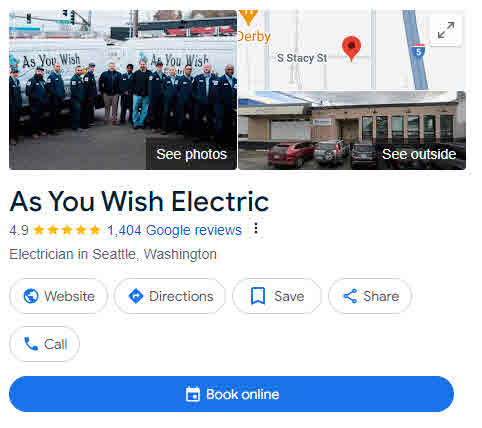The 2024 (and beyond) SEO Playbook for Service Businesses
Curious how to approach SEO for your service business?
Look no further – we’ll lay out all the basic elements for you in prioritized order…
Google Business Profile

Your Google Business Profile is arguably the most visible element you’ll have in Search. What’s more, because it’s heavily influenced by the searcher’s proximity to your business, even small businesses can compete against huge companies in their local market (unlike other parts of Search).
Visit the Google Business Profile site.
Pro Tip: The more fully you flesh out your Profile (and the more reviews you get), the more visibility you’ll get in your market.
Basic Brand SEO
To make sure your business is showing up properly in Google when someone searches for it you’ll want to register your business or create a business profile on as many sites as possible, including (as appropriate):
- Bing Places for Businesses
- Apple Maps
- All local and national directories you can access (Yellow Pages, etc)
Pro Tip: Make sure that your business name, phone numbers, addresses business categories are exactly the same (where possible) on all your listings and profiles.
Basic Technical SEO
There are a number of technical conventions that Google expects to see when it’s indexing your website. Following these basic conventions is or less a requirement if you want your site to show up!
Check out the Google Guide to Search
Services Optimization
Do you have multiple searches you want to show up for?
Create a unique service page for each one and optimize them following the guidelines at Google Search Central.
Also, check our our series on Service Pages.
Locations Optimization
Make sure that your location and contact information is featured prominently on your website. Consider having your information both in your footer and in a Contact or Location page.
If you have multiple locations, make sure that you have fully fleshed out Google Business Profiles for each. As well, ideally you’ll have separate and optimized locations pages on your website for each location.
Linking Structure on Your Website
Make sure that the most important services or pages on your website are linked to frequently on the site and from as high up on the page as possible.
Because Google considers your home page the most important page on your site, whatever pages you link to from high on your home page will be considered important as well.
For instance, you might have links to your top 3 services from very near to the top of the page. This same logic applies throughout the site – don’t be stingy with links to your important pages (and include them high on the page)!
Links From Other Sites
While linking strategies have changed over the years, high quality links from legitimate websites are still seen as “votes” that your website is legitimate and credible to Google.
With all other things being equal, a site that has more quality links than another site will outrank it.
That said, it’s hard to get links. Also, paid link building services will generally harm more than help as they rely on low quality websites, which can result in Google “penalizing” your site.
So how can you get links? Here are a few ideas:
- Suppliers or partners who have resources sections or partner sections on their sites where they might link to you.
- Local groups that you sponsor.
- Other businesses in your area that refer people to you.
- Local news articles about your business.
- Other companies or individuals that you feature on your site or blog (they can link to you).
There are advanced linking opportunities if you have a content strategy and create great posts, although these strategies are usually beyond the reach of most smaller companies.
Content Strategy
To compete at the highest levels you’ll need a Content Strategy that supports your SEO. Generally this takes the form of a blog or news section where you regularly publish posts on topics that are relevant to your businesses and services.
It’s too big a topic to dive into here but the best content strategies involve creating valuable educational posts for your most important audiences and making sure they are well optimized. In addition to supporting your SEO, these boost your credibility, position you as an industry leader, and make you the logical company to choose for your services.
Competitive SEO
By leveraging tools like Moz or Ahrefs you can identify your top competitors, assess how they are ranking for important keywords and then dig in to find out what they are doing in SEO and how to beat them.
In fact, having a high level look at your competition before even starting on SEO might give you some insight on what you can expect to achieve in SEO and how much effort it will make sense to put into it.
We often use the MOZ’s Link Explorer to measure the Domain Authority of a website and then check on the Domain Authority of several of the competitors who are appearing on the first page of Google results. This gives us huge insight as to the payoff that SEO will bring:
- If a site has higher authority than some of the first page competitors, optimizing it will almost always allow them to rank there as well. In this case, SEO totally makes sense and should result in more traffic fairly quickly (within a few months).
- If a site has similar authority to the first page competitors, you’ll have to work a bit harder to beat them but SEO should result in more traffic in the medium term (within a year).
- If a site has dramatically lower authority than the first page competitors, it may take a creative approach or a long term (potentially multi-year) investment to get traffic. In this case it may make sense to invest resources in other places like sponsored Search Ads instead of SEO.

Closing Thoughts
While there are more advanced strategies, doing a great job on your SEO basics (all the elements before the Content Strategy above) will serve you well. The big thing to remember about SEO is it does take some time, but if you invest in doing it strategically it will pay off for you.
Curious about your SEO situation? Get in touch!









